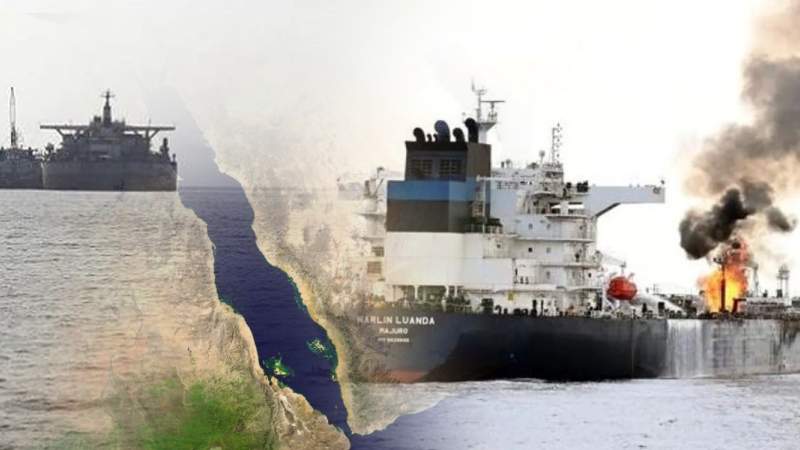Yemen Launches New Phase of Naval Blockade, Shifting the Rules of Engagement

Yemen: In its boldest move yet in the Red Sea operations, the Yemeni Armed Forces have announced the transition to the fourth phase of the naval blockade against the Zionist entity.
This new phase marks the peak of a gradual escalation that began in response to the Zionist aggression on Gaza. It is characterized by a calculated expansion in the target list and a strategic shift from targeting ships directly heading to Israeli ports to imposing comprehensive sanctions on any company that continues commercial dealings with those ports—regardless of the company's nationality or the vessel's destination.
Phase Four includes monitoring and targeting vessels belonging to some of the world’s largest shipping companies—such as Maersk, CME, Hapag-Lloyd, and Evergreen. The threat now extends beyond ships headed to Israeli ports to include any vessel owned by companies engaged in business with those ports, wherever they may be.
Yemeni forces have already begun tracking vessels operating between Eastern Mediterranean ports and Israeli harbors, as well as oil tankers supplying the Zionist entity daily.
Despite the closure of Umm Al-Rashrash Port for several months, this latest escalation aims to broaden the blockade to include Haifa and Ashdod ports—signaling a far-reaching strategic shift in the depth of the Mediterranean. Sana’a has underscored its seriousness by documenting operations, including footage of the sinking of ships bound for Eilat, as proof of its threats’ credibility.
Unconventional Challenge and the Failure of Deterrence
The Zionist military establishment now faces what it describes as an "unconventional adversary"—one that does not follow traditional patterns in deployment or targeting. The decentralized structure of Yemeni military operations, coupled with geographic advantage and flexible movement, has reduced the effectiveness of airstrikes, rendering Israeli retaliation little more than symbolic punishment rather than a true deterrent.
Zionist commentator Yoni Ben Menachem noted that the absence of permanent military bases or clearly identifiable sensitive facilities in Yemen, alongside the efficiency of Sana’a’s security apparatus, has rendered Israeli responses ineffective—creating internal disruption without achieving operational gains.
Similarly, US preemptive strikes on Yemeni targets in recent months have failed to deter Sana’a or halt its naval campaign. The first wave of American strikes had no measurable strategic effect.
Field Legitimacy and a Shift in the Regional Political Landscape
Ironically, despite a significant disparity in military capabilities between Yemen, Washington, and Tel Aviv, Yemen has maintained a consistent operational pace—steadily escalating over time. This development indicates that US deterrence is no longer sufficient against non-traditional actors in the region.
Parallel to the military path, a deep political shift is also taking shape. The government in Sana’a—once labeled illegitimate or rebellious—is now building functional, field-based legitimacy, stemming from its ability to influence the balance of power. This influence extends beyond Yemen's borders into the broader region. Its success in imposing a maritime deterrence equation and maintaining a disciplined political discourse has given it growing political and media presence on the regional stage.
These transformations point to a new political reality taking shape in the region—driven not by negotiations or foreign sponsorship, but by the accumulation of internal strength, consistent messaging, and effective field performance.
Ongoing Attrition and an Uncertain Future for Mediterranean Shipping
As pressure on Gaza intensifies, the Yemeni Armed Forces continue their direct escalation against the Zionist entity without retreat—unhindered by containment efforts or retaliatory strikes.
This latest escalation reflects not only military determination but strategic capacity to extend the areas of attrition and impose new rules deep into maritime zones—amid a stark absence of any effective counter-response. If this momentum continues, the balance of naval power in the Eastern Mediterranean may enter a far more volatile phase—one that cannot be restrained by rhetoric or resolved through aerial bombardment alone.
The Yemeni Armed Forces have announced the launch of a new phase in their naval blockade against the Zionist entity, targeting all ships belonging to companies that deal with ports in occupied Palestine, regardless of the company's nationality or the ship’s destination.
In a statement, Armed Forces spokesman Brigadier General Yahya Sare'e declared: "The Yemeni Armed Forces have decided to escalate their military support operations and implement the fourth phase of the naval blockade on the enemy. This phase includes targeting all ships belonging to any company that deals with Israeli ports—regardless of the company's nationality and wherever our forces can reach them."
These actions are framed as part of a broader Yemeni strategy to enforce an aerial and naval blockade on the Israeli enemy in response to its war crimes and humanitarian blockade of Gaza. By continually threatening key points in occupied Palestine, the Yemeni forces aim to create both material and psychological pressure to halt the assault on Gaza and open humanitarian corridors.
-
10:13
Palestinian Sources: Israeli enemy forces raided several homes in al-Mughayyir village northeast of Ramallah in the occupied West Bank
10:12
Palestinian Sources: Four injured as Zionist-entity drones drop explosives on tents of displaced families near Gaza City’s Currency Market
10:11
Palestinian Sources: A woman has been killed by fire from an Israeli enemy drone in the Halawa Camp area of Jabalia al-Balad, north of the Gaza Strip
07:39
Gaza Ministry of Health: The death toll from the Israeli aggression has risen to 70,365 martyrs, 171,058 wounded since the beginning of the assault on Gaza
07:39
Gaza Ministry of Health: 376 martyrs, 981 wounded since the ceasefire on October 11





